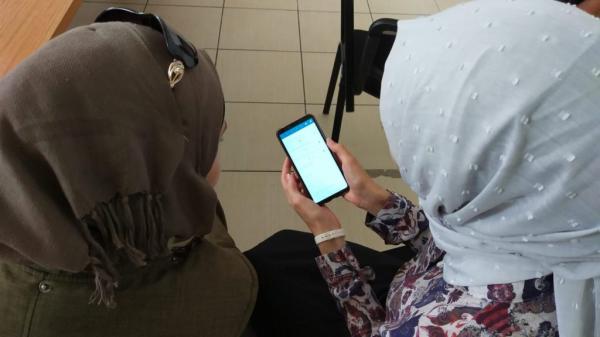Innovative refugee healthcare app links women to their families’ medical records and local healthcare networks
By Chris Welsh
Dr Aral Sürmely got the idea for Hera, a smartphone app that enables Syrian refugee women to access medical services, while working in an ambulance crew in Istanbul.
One thing struck him again and again. Many, if not most, of the emergencies he was treating were preventable, and a large number of the patients were Syrian refugees.
“I was shocked to see what was going on,” he says. “It would be a young boy having breathing difficulties that could have been avoided if he’d had his immunisation, or an expectant mother with a medical emergency in my ambulance because she didn’t go to her pre-natal check-ups.”

He realised that the disruptions caused by forced migration were cutting off refugees from some very basic healthcare, as well as from their health records and other medical information. In an unfamiliar country and dealing with an unknown language, they were particularly vulnerable to being excluded from medical services. He saw a possible way to link them to better health care.
“We saw that the refugee population has mobile phones, because that’s not a luxury anymore, it’s a lifeline for them,” he says. “So we knew the solution had to be digital. A mobile solution for a mobile population.”
The app he developed, called Hera, bridges the gap between Syrian women refugee women and the care they and their children need provides a versatile bridge by allowing the user to carry their medical records with them on their smartphone. Hera aims to increase the rate of prenatal care and childhood vaccinations among Syrian refugees in Turkey. HERA’s goal is to prevent health problems for refugees and thereby decrease deaths. It sends reminders when things like immunisations or check-ups are needed, and also contains emergency information about their location, such as where the nearest hospital is. Hera can even be used to call an ambulance. The app can be used in Arabic, Turkish, and English, helping bridge language gaps. And it even provides the means to provide conditional cash transfers to help the user pay for transport and help make up for any lost income if they have to leave work for an appointment.

A global problem
Hera stands for Health Records App, and for the Greek goddess Hera, “because she was the most powerful goddess in Greek mythology, and we really want to empower these women,” Aral says. Hera won the audience award at the EIB Institute’s 2020 Social Innovation Tournament and a €10 000 prize.
The Social Innovation Tournament is a flagship initiative of the EIB Group Institute’s Social Programme, recognising and supporting the best European entrepreneurs whose primary purpose is to generate a social, ethical or environmental impact.
Aral and a small team began work on the app in 2017, after being awarded a grant from a non-governmental organisation called Grand Challenges Canada. Since then it has received other seed funding.
Right now, about 1 000 women in Turkey are using the app. Aral says Hera is in the process of expanding the programme to 10 000 women next year. In 2022, he hopes to partner with the Turkish Ministry of Health, so that more families can be reached and that the data gathered by the app can help the Ministry target its services to help this special group.
But the Hera team is already thinking beyond Turkey. Neeru Narla, Hera’s chief medical officer, met Aral when they were both getting their master’s degrees in public health at the Harvard School of Public Health. They think Hera could be a big help globally.
“One of the interesting things about working with refugees is that even though the cultural aspects can be very different, the needs of displaced people everywhere are really similar,” she says. “A lot of people need this.”
The group decided to pursue a social enterprise model to ensure Hera’s sustainability. Ultimately, Hera would charge healthcare systems and large organisations working with refugees for the app and keep it free for its users. Aral says this makes sense for the organisations; paying a small amount to provide Hera will save lives – and a lot of money and stress on local healthcare systems.
“Emergency care is very expensive,” he says. “You can imagine what it cost with that little boy I mentioned with breathing difficulties – the ambulance with oxygen, the hospital. Or a $2 vaccine that he should have had two years ago.”